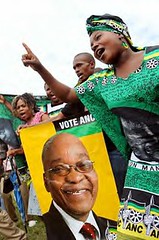
Winning ways while thousands of supporters attended the ANC’s rally at Coca-Cola Stadium. (Photograph: Paul Botes)
Originally uploaded by Pan-African News Wire File Photos
By James Shikwati
South Africans are grappling with political independence for blacks who control less than 10 percent of the economy.
That explains in part why voters chose to vote for "Lethu Mshini Wami" (Bring Me My Machine Gun.) To them, the struggle is far from over.
The obsession with whether the African National Congress garnered a two-thirds majority or not by Western media is driven by the apprehension of what might befall the population that controls 90 percent of South Africa’s economy should Jacob Zuma opt to make use of his "Mshini".
The African National Congress is said to have used the philosophy of "each-one-teach-one" during the struggle against apartheid to ensure that the blacks who went to school taught those who were out fighting.
In post-apartheid era, the black elites, supposedly led by Thabo Mbeki, "forgot" their brothers in the struggle.
Last year’s push by black South Africans to evict other Africans from their country was driven by the quest to access the economic pie through jobs and business.
Many firms in South Africa opt to employ educated Africans from neighbouring countries and find it difficult to absorb the "uneducated" freedom fighters — leading to an army of angry youth that view foreigners as their economic enemy.
Who else would have been their best candidate other than the one asking for a machine gun!
Jacob Zuma’s sweeping victory in South Africa is a pointer to the undercurrents that drive African politics.
Africans have started asking the "hard questions" such as: "Who controls the economy?"
"Is political freedom enough?" "Does the law (constitution) that relegates the majority into a crowd of dancing voters instead of economic producers serve Africa’s interests?" "Does Christianity (for example) define an African?"
Western market concerns over South Africa are simply a pointer to a system fighting to sustain global economic status quo.
The greatest challenge for African leaders is how to raise revenue from and serve populations that are generally disenfranchised from the global market systems and build institutions that are respected by all.
Under the current global economic order supervised by the World Bank and the International Monetary Fund; African leaders are continuously bombarded with instructions; imposed international treaties and competing investors’ interests.
This breeds corrupt and detached leadership that ignores policies that ought to give more Africans a fair chance at the market place.
Lessons from Kenya and South Africa itself point at the fact that maintaining the economic status quo that has turned the majority into spectators at the market place is more costly.
In the eyes of Tanzanians for example, Kenya’s economy is controlled by non-Kenyans assisted by a few elites that act as mere fronts.
The resultant effect has been insecurity and mushrooming of killer gangs in search of economic survival.
Kenyans are now grappling with organised gangs such as Mungiki that are said to be mainly descendants of freedom fighters that were shortchanged by political elites.
Ethnic tensions are rife in Kenya precisely because one community is seen to have built their enterprises through political patronage.
South Africa, on the other hand, records high rates of crime, rape and even murder as disenfranchised populations seek to break into the class of wealth generators.
Last year, I participated in a closed-door session with Jacob Zuma, now South Africa’s President-elect.
He struck me as an individual who is very much aware of the challenges that the black majority face in his country.
I am, however afraid that he will soon find himself walking over hot coals — something that will create a false impression that he is a dancing President!
It is not going to be easy for the minority that control 90 percent of the economy to cede ground to allow for economic freedom that will facilitate free participation in growth of South Africa’s economy.
For long-term purposes, it will be strategic for those who fear a Jacob Zuma presidency to review the law and draw the majority into the productive sector.
Such a move will guarantee the elites peace as they sip evening tea at their verandah.
To ignore Africans who have been disenfranchised by the global market order is to breed anarchy.
The most urgent agenda for leaders on the continent ought to be to increase productivity among its people devoid of World Bank controlled development experimentations on Africans.
Zuma’s "Lethu Mshini Wami" must protect all.
--James Shikwati is the director of the Inter Region Economic Network and he can be contacted on james@irenkenya.org.
No comments:
Post a Comment